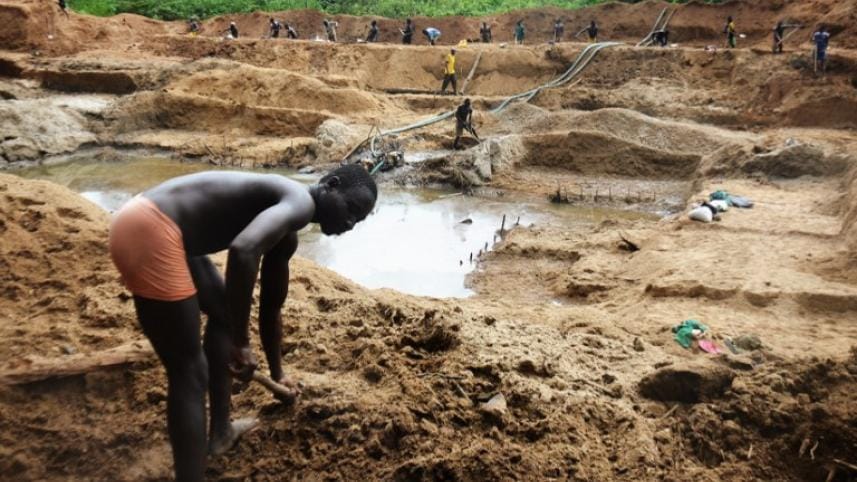Central Africa's diamonds come at high price in blood and sweat

They all share the same desperate hope -- that one day they will find a diamond that will change their miserable lives forever.
The mine at Banengbele, near Boda in the south of the strife-torn Central African Republic, is one of many in the region where groups of diggers -- or "Nagbata" as they are called -- toil like ants with shovels and spades for the equivalent of three dollars a day.
The owner of the mine takes a cut of that for food, with many of the miners supplementing their meagre rations with bush meat like snake caught in the surrounding jungle.
Conditions in the camp are grim. Four men sleep in a makeshift shelter no more than 1.5 metres wide (five feet) made of sticks, plastic sheeting and a mosquito net.
After long days of back-breaking labour in terrible heat, many numb themselves with cannabis and palm wine.
"We work hard. I ache all over," said Jean Bruno Sembia.

"I have to survive somehow," she said holding her baby, whose head was covered in pustules. "My husband was killed in the war. I earn three euros (dollars) a day cooking for the men and I spend between five days and a month at a time out here in the camp."
Smuggling and sacrifices
The miners sacrifice chickens and give money to children in the hope that the spirits will smile on them in a country where neither Christianity nor Islam has entirely displaced traditional animist beliefs.
"Every morning I pray to God to help me find big diamonds," said Laurent Guitili. "One day for sure I will find a big one. Then I will be able to have my own mine and earn all the money I need."
When one of the miners does find a gem, the person who holds the concession takes it and sells it, giving them back between 30 and 60 euros per carat.

But at least in Boda miners are paid. In the north of the country, where some of the country's richest mines are still in the hands of armed groups, they are forced to hand over what they find at gunpoint.
The Kimberley Process, the international body which tries to stop the sale of so-called blood diamonds, slapped a ban on the export of diamonds from CAR after the overthrow of president Francois Bozize in March 2013 by Seleka rebels threw the country into civil war. The mainly Muslim insurgents had allegedly funded their revolt with illegal diamonds.
Seleka and rival "anti-balaka" Christian militias have since battled to control the mines, the economic lifeblood of the impoverished country, with smuggling booming.
"If you are armed you can have diamonds," said former prime minister Martin Ziguele. "And with those diamonds you can buy more arms and fund your rebellion."
French and UN peacekeeping troops have tried to wrest control of the mines from the armed groups so the legal trade in diamonds can restart, vital to putting the shattered economy back on its feet.
The government hopes the embargo can be partly lifted at the next Kimberley Process meeting in Luanda in Angola later this month.
Francois Ngbokoto, of the ministry of mines, said the export ban may now actually be encouraging smuggling.
Sectarian violence
Since the sectarian violence that erupted as the Seleka rebels were driven out, the town of Boda has been divided in two, with Muslims -- who used to control the diamond mines in the area -- forced to take refuge in their own enclave.
The mines are now held by the country's Christian majority having passed through the hands of both of the Seleka and the anti-balaka militias during the fighting.
"It is better to work for someone from here," one of the Nagbata said, referring to Christian owners.
One official told AFP that jealousy at the relative wealth of Muslims had been one of the "underlying problems" which aggravated sectarian violence in the region.
That resentment has not gone away. At Boda's mining police office a sign shows a miner selling a diamond to a bearded Muslim middleman with the warning: "Nagbata do not sell your diamonds to illegal buyers."
Moussa Traore, a Muslim dealer who set up in the town two months ago after getting a licence from the ministry of mines, insisted he sells his diamonds legally to the government's central office in the capital Bangui.
However, miners and the authorities claim a huge amount of smuggling is going on, with Central African diamonds being channelled through neighbouring Cameroon, Chad, DR Congo and Sudan.
All agree that without the boost in the economy that lifting the export ban would give, there will be no peace in the country.
"With the embargo the price of diamonds has dropped," said Traore. "They need to lift the embargo so proper business can start again."



 For all latest news, follow The Daily Star's Google News channel.
For all latest news, follow The Daily Star's Google News channel.
Comments